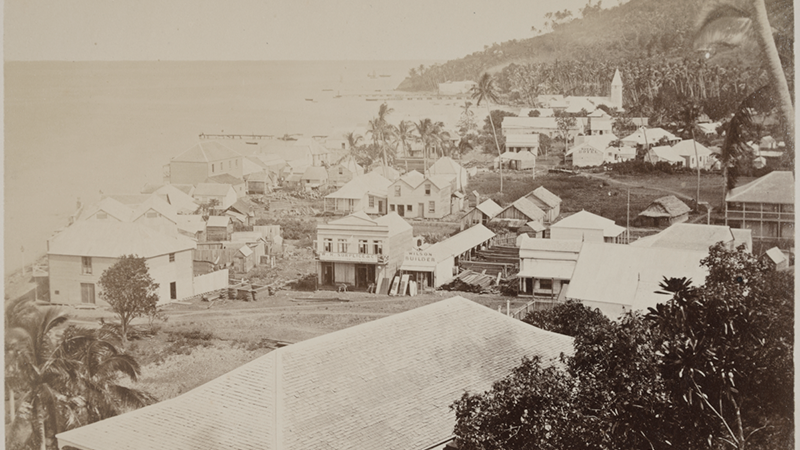Levuka
In the 1870s Levuka was a small and bustling cosmopolitan centre with 1000 inhabitants. In addition to European settlers, the town attracted people from throughout Fiji from the beginning of the Cakobau government of 1871 and during the first years following cession. The colonial capital moved to Suva in 1881.
Built along the shores of Ovalau Island beneath massive volcanic hills, Levuka was founded as a new settlement by European traders during the 1820s. It soon became one of the main ports in the south Pacific for trading ships and whalers. During its early years it had a reputation as a rough and disorderly town.
The demography and nature of the town shifted with growing settlement, with the first Christian mission established in 1858 by Marist priests led by Father Bréhéret and the Methodist Church built in 1862. The growing mercantile and professional community, backed by the British Subjects' Mutual Protection Society, founded Fiji's first newspaper, bank, town hall, hospital and private members club.
"Levuka boasts of some stores of considerable size, where you can buy anything from a cask of beef to a ship's anchor, from a fish-hook to a silk dress... Vegetables can easily be purchased from natives... as well as fowls, eggs, fish, and so forth." (John Anderson on arrival in Levuka, October 1875).

Levuka. Overview of the southern part of Levuka looking southwards over Wilson's builders yard and W.H. Surplice & Co (auctioneers and commission agents), on past the Royal Hotel and Roman Catholic church. Photographed by F. Dufty, c.1875, Levuka, Ovalau Island, Fiji. P.100055.VH
'Levuka in Ovalau. Fiji. 19th Sept. 1875'
Constance Gordon Cumming
"Just then a bright gleam of sunshine fell like a ray of promise on the little town, with its background of richly wooded hills, and dark craggy pinnacles far overhead, appearing above the white wreaths of floating mist..."
- Constance Gordon Cumming, September 1875.
This watercolour, painted from a boat off Levuka, is signed by residents of Levuka and Nasova, including Alfred Maudslay, Arthur J. L. Gordon and Sir Arthur Gordon.

1998.55
